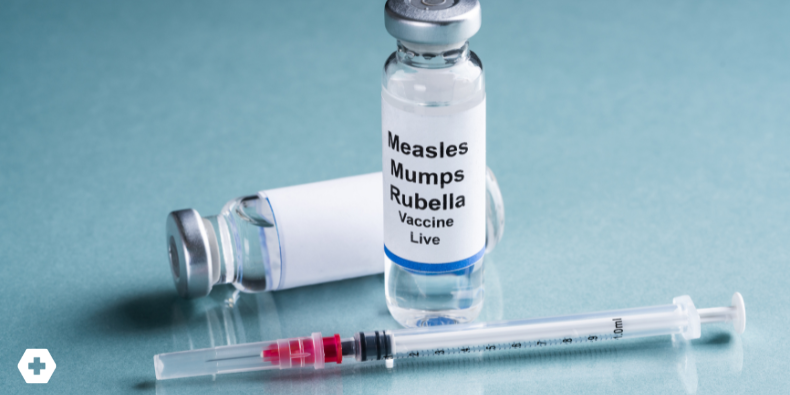
MMR Vaccines in the Time of Measles Outbreak

It is tragic that in 2025, measles—a fully preventable disease—has caused two deaths (at the time of writing) and sickened hundreds across the United States. With outbreaks making headlines, patients are flooding our inboxes and exam rooms with urgent questions:
- I got my shots when I was a kid. Am I still immune to measles?
- Do I need a booster during this outbreak?
- Should I check my immunity with a blood test?
- Can I get another MMR to help boost my immunity? Will that help protect my friends and family?
- What about infants too young for vaccination?
- My niece is breastfeeding her infant; should she get another MMR to convey more immunity through her milk?
So, what do we actually tell our patients? And what does the data say? Let’s walk through the research and guidelines to help you confidently answer these common MMR questions.
Let’s Do a Quick CDC Recap
A quick review of the current CDC recommendations for the MMR:
|
Routine Vaccination |
Two doses; one between 12-15 months and one between 4-6 years old |
|
Catch-up Vaccination for unvaccinated children/teens |
Two doses at least 28 days apart |
The CDC reports that one MMR dose is 93% effective against measles, and two doses are 97% effective.
Let’s boil the vaccine booster recommendations down as simply as we can:
ADULTS:
|
Who am I? |
Do I need a booster? |
Why? |
|
Adults born before 1957 |
No |
Likely immune to measles from natural infection during childhood. |
|
Fully vaccinated adults born in 1957 or later
|
No |
Considered fully immune. |
|
Adults born in 1957 or later, but vaccinated between 1963-1967 |
Yes, consider additional dose |
May have received the inactive virus vaccine available during these years. Vaccinate unless proof that a live virus vaccine was given. |
|
Adults born in 1957 or later and vaccinated between the years of 1968-1989
|
Yes, consider additional dose during outbreak |
May have only received one vaccine and is considered not fully immune. One dose is 93% effective, where two are 97%. |
|
Adults born in 1957 or later, but at higher risk or those traveling internationally |
Yes, consider additional dose during outbreak |
Increased exposure risk (including healthcare workers) |
|
Adults born in 1957 or later who have never received a measles vaccine |
Yes |
Two doses of MMR, 28 days apart |
* Laboratory measles IgG titer or documentation of physician-diagnosed measles infection
What is so special about 1957 besides Elvis buying Graceland and the Russians launching Sputnik?
Adults born before 1957 are considered immune to measles due to the likelihood of natural infection during childhood. Adults born in 1957 or later need documented proof of vaccination or evidence of immunity, as this group is not considered naturally immune.
What is so special about the years 1963-1967?
When the first measles vaccine became available in 1963, two were available. One was a live attenuated vaccine, and the other was a formalin-inactivated vaccine. The latter was found to only provide short-term immunity and was taken off the market. So, those adults are not immune today. The Advisory Committee on Immunization Practices (ACIP) recommends revaccinating those who received the inactive vaccine or do not have documentation of which vaccine they received before 1968. Starting in 1968, only a live attenuated vaccine for measles was given.
What is so special about the years 1968-1989?
During these years, the CDC only recommended one dose of the measles vaccine. So, patients vaccinated during these years with only one documented dose can consider a booster, especially in times of outbreak. Though again, a single dose is known to be 93% effective.
INFANTS:
During an outbreak or before international travel, infants over six months of age can get an early dose of the MMR. However, this early dose does not replace their routinely scheduled immunizations due after their first birthday, so these children will get a total of three doses.
What about babies under 6 months of age who can’t get an early dose during an outbreak?
|
A quick timeout for an immunology refresher → The MMR vaccine induces IgG antibodies. Breast milk transfers primarily secretory IgA antibodies from mother to child. IgA helps provide mucosal immunity to the GI, respiratory, and urogenital tracts. Breast milk contains significantly lower amounts of IgG and IgM, not in significant quantities for immunity. IgG antibodies are primarily transferred via the placenta during the 3rd trimester of pregnancy. |
The MMR vaccine, though contraindicated in pregnancy because it is a live virus, is considered safe in lactation. It is not recommended to be given to nursing mothers with the explicit purpose of boosting passive immunity in their nursing infants, though it will help maternal immunity. A study by Hisano et al., which studied the measles-rubella vaccine in the early puerperal period, found the vaccine effective in increasing maternal immunity but did not show significant passive immunity through breast milk.
Various studies (Mathew JL et al., Leuridan E, et al., Muthiah N et al.) have investigated how long infants are provided measles immunity from their mother’s IgG antibodies. The results vary, showing protection for approximately three to six months after birth, with rapidly declining protection after 6 months, which is why the recommendation from ACIP is to give that early MMR dose at 6 months during an outbreak or before international travel.
What if I have been exposed to someone with an active case of the measles?
For postexposure prophylaxis (PEP) for known measles exposure, the ACIP recommends the MMR vaccine within 72 hours of exposure in patients who are unvaccinated or have only received one dose. Immune Globulin can be given up to 6 days post-exposure and is recommended in high-risk populations, including infants under 12 months, pregnant patients without documented measles immunity, and severely immunocompromised patients.
So, should I have been given an MMR booster at my recent well-adult visit?
Well, it’s complicated. I was born in 1974, which was during the CDC’s one-dose recommendation time period. I was unaware of my own immunization history (as embarrassing as this is to admit as a clinician), but I did some digging into my vaccination history after the appointment, I found I had already had three prior measles vaccines, making my recent shot unnecessary, but not harmful.
The good news is that most of our patients >1 year old should have at least one dose of a measles vaccine, giving them 93% protection against this current outbreak. With informed, shared decision-making and record review, we can help our patients determine if another measles vaccine would be reasonable to provide better protection.
The ACIP states the “simplest approach to resolving concerns about MMR vaccination is to revaccinate,” noting that serious adverse reactions to the vaccine are rare. They also note that there is no evidence to indicate an increased risk for adverse vaccine reactions for patients who are already immune. So, if in doubt, give a booster to help protect our patients and our community.
If you want more insights on what clinicians need to know about measles, check out our full conversation with Dr. Liza Mackintosh and Dr. Mike Cosimini on our most recent episode, "Measles Alert: Presentation, Management, and More," on Hippo Education Presents: The Monthly Rounds, our free podcast on Spotify and Apple Podcasts.
Practice-Changing Education
Experience education that goes beyond theory. Explore Hippo Education’s offerings below.





.png)



